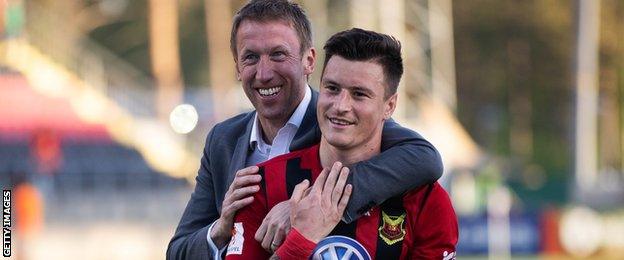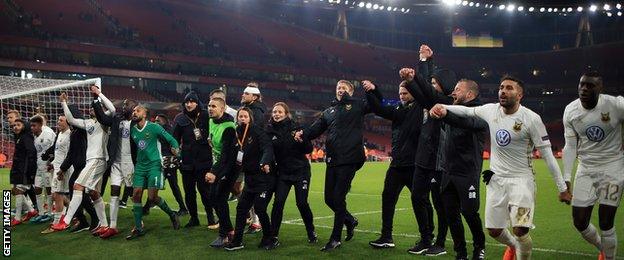Graham Potter: Swansea City's scholarly new manager
- Published
New boss Graham Potter positive about finding 'Swansea way'
It was sitting on a team coach at the tail-end of an unremarkable football career when Graham Potter decided he wanted to go back to school.
A professional footballer for 12 years, taking in 10 clubs, Potter played in all five top divisions in England but describes his career as "pretty rubbish."
Potter was sifting through a tabloid newspaper on route to another lower league ground or another when he decided education was to be his future.
It was then his Eureka moment occurred as he felt he was not really engaging with the material.
"That is right, there were two things. I was skim-reading a tabloid on the bus, just not taking it in," he explained.
"My mum had always pressed on me to continue my education, and it was just the volatility of sport in terms of not being able to control the result."
The result? A five year stint in the education sector, though his return to learning started when he was still playing for Southampton and working towards a social sciences degree.
Potter took on development roles at two universities, Hull and then Leeds Metropolitan after hanging up his boots, while also completing a Master's in leadership and emotional intelligence.
"In football you can work hard, play well and still lose," Potter continued.
"It is a game so you can lose, so I liked the idea of working towards something and getting something you cannot take away from you [a degree]. That's what you get from the education sector.
"I would like to think it made me more rounded.
"I was not confident when I stopped playing, I did not like standing up in front of people or the sound of my own voice.
"I needed to try and gain some confidence. I did not just want to be the ex-footballer. I wanted to be more than that and I liked learning.
"I remember getting on the team bus after one game, my degree was in American politics and the EU, and the lads were looking at me going 'what on earth are you doing?' But I enjoyed it."
Then came the task of turning theory into practice.
"I was 30 years-old and had stopped playing. I realised I wanted to coach and I wasn't going to get the opportunities but also I wasn't good enough to get the opportunities as a 30-year-old ex-player for 12-13 years," Potter explains.
"My skillset at that particular time wasn't good enough to get a coaching job at any sort of level. Like everybody I needed to learn to be a coach, I needed to practise that and make mistakes in a decent environment where I could develop myself and not fear I was going to lose my job.
"I had five years in the university sector which was a time where I could make my mistakes, develop with the students and players there. I also worked with the people at the university to put some concept and theory on my own experiences."

Graham Potter and Jamie Hopcutt of Ostersunds FK celebrates after the victory during the Allsvenskan match between Ostersunds FK and IK Sirius FK
Looking at footballers as people not commodities
Potter's route to the Liberty Stadium, via coaching students and then seven years building success in Sweden at Ostersunds FK is far from conventional.
Potter believes his experiences in the classroom have equipped him for management, every bit as well as time spent in dressing rooms.
"It was an important thing for me to do over that five-year period. I [already] had experiences as a player," he said.
"I was fairly rubbish as a player. I was never going to get these great jobs on the back of my glittering playing career.
"So then I needed to work out how to communicate, how to lead people, how to structure a programme and when you are working in an university, it seemed sensible to take advantage of the programmes that were there.
"The programme that I did I was with surgeons; I spent time with [people from] the military so you are starting to get an understanding of leadership from different contexts.
"It's then about applying it to football. Ultimately you still have to try and get good players on the pitch and win football matches.
"You are dealing with people, you are dealing with stress, you are dealing with a loss of confidence, you are dealing with interpersonal relationships. To have an understanding like that is important.
"It's not just about putting on a training session."

Ostersunds FK players celebrate their unlikely victory at Arsenal in last season's Europa League
Bonding via dance and song
Not afraid to try things that would seem alien to many in football, Potter's embracing of the culture in Sweden has seen him do some things that would be viewed as highly unconventional.
Like what, you might ask? Well, like putting on a ballet production, featuring Ostersund players and staff, for the local community.
"I was doing an improvised dance solo in the middle of the stage on my own which was terrible, it really was. I was also involved in some of the dance moves. I am just an all-round bad dancer," he said of the club's production of Swan Lake.
That was not even his musical highlight.
"We also did a singing performance in front of 1,600 people where I performed the Yampland national anthem, in the local dialect, as the opening bit of the show. That was daunting," he recalled.
"But for supporters to see players as human beings, with their families and doing more than putting the shirt on is important.
"You are asking them to have a little bit of patience and if they have had time with you and connected with you in some way, they can be even more supportive of you."
So while it is fair to say Potter is fully focused on getting the Swans to the Premier League, do not be surprised to see him at an Eisteddfod near you.